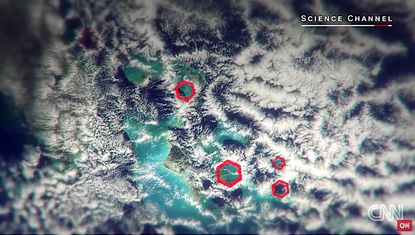Experts claim 'air bombs' explain Bermuda Triangle mystery


The "Bermuda Triangle" is the stuff of legend — in both senses of the word. The area of the Atlantic Ocean between Florida, Puerto Rico, and Bermuda has seen its share, or maybe more than its share, of mysterious disappearances of ships and aircraft, leading to a popular theory that some paranormal force is at work in the triangular body of water. Two meteorologists tell the Science Channel that hexagonal cloud patterns, 20 to 55 miles across, are likely to blame for the Bermuda Triangle phenomenon.
"These types of hexagonal shapes over the ocean are in essence, 'air bombs,'" said Dr. Randy Cerveny at Arizona State University. "They're formed by what are called microbursts. They're blasts of air that come down out of the bottom of the clouds and hit the ocean, and they create waves that can sometimes be massive in size once they start to interact with each other." These "air bombs," with winds up to 170 miles per hour or 100 mph near sea level, are strong enough to sink ships by creating huge waves or pounding down airplanes from the sky, Cerveny tells the Science Channel. Other meteorologists disagree with this theory, noting that it is based on weather patterns in the North Sea off Britain, which has a very different climate. You can learn more in the CNN report below. Peter Weber
Subscribe to The Week
Escape your echo chamber. Get the facts behind the news, plus analysis from multiple perspectives.

Sign up for The Week's Free Newsletters
From our morning news briefing to a weekly Good News Newsletter, get the best of The Week delivered directly to your inbox.
From our morning news briefing to a weekly Good News Newsletter, get the best of The Week delivered directly to your inbox.
Create an account with the same email registered to your subscription to unlock access.
Sign up for Today's Best Articles in your inbox
A free daily email with the biggest news stories of the day – and the best features from TheWeek.com
Peter has worked as a news and culture writer and editor at The Week since the site's launch in 2008. He covers politics, world affairs, religion and cultural currents. His journalism career began as a copy editor at a financial newswire and has included editorial positions at The New York Times Magazine, Facts on File, and Oregon State University.
-
 'Elevating Earth Day into a national holiday is not radical — it's practical'
'Elevating Earth Day into a national holiday is not radical — it's practical'Instant Opinion Opinion, comment and editorials of the day
By Harold Maass, The Week US Published
-
 UAW scores historic win in South at VW plant
UAW scores historic win in South at VW plantSpeed Read Volkswagen workers in Tennessee have voted to join the United Auto Workers union
By Peter Weber, The Week US Published
-
 Today's political cartoons - April 22, 2024
Today's political cartoons - April 22, 2024Cartoons Monday's cartoons - dystopian laughs, WNBA salaries, and more
By The Week US Published
-
 OJ Simpson, star athlete tried for murder, dead at 76
OJ Simpson, star athlete tried for murder, dead at 76Speed Read The former football hero and murder suspect lost his battle with cancer
By Rafi Schwartz, The Week US Published
-
 Momofuku's 'Chili Crunch' trademark uproar
Momofuku's 'Chili Crunch' trademark uproarSpeed Read The company's attempt to own the sole rights has prompted backlash
By Rafi Schwartz, The Week US Published
-
 Kevin Hart awarded Mark Twain Prize
Kevin Hart awarded Mark Twain PrizeSpeed Read He is the 25th recipient of the prestigious comedy prize
By Peter Weber, The Week US Published
-
 Is Downton Abbey set to return for a final film?
Is Downton Abbey set to return for a final film?Speed Read Imelda Staunton reveals that a third movie may be in the pipeline
By Adrienne Wyper, The Week UK Published
-
 'Oppenheimer' sweeps Oscars with 7 wins
'Oppenheimer' sweeps Oscars with 7 winsspeed read The film won best picture, best director (Christopher Nolan) and best actor (Cillian Murphy)
By Peter Weber, The Week US Published
-
 'Rust' armorer convicted of manslaughter
'Rust' armorer convicted of manslaughterspeed read The film's cinematographer Halyna Hutchins was shot and killed by actor Alec Baldwin during rehearsal
By Peter Weber, The Week US Published
-
 The Beatles are getting 4 intersecting biopics
The Beatles are getting 4 intersecting biopicsSpeed Read Director Sam Mendes is making four separate movies, each told from the perspective of one band member
By Peter Weber, The Week US Published
-
 Taylor Swift to Miley Cyrus: female artists dominate 2024 Grammys
Taylor Swift to Miley Cyrus: female artists dominate 2024 GrammysSpeed Read SZA, Phoebe Bridgers and Lainey Wilson were also among the winners at LA gala
By Arion McNicoll, The Week UK Published